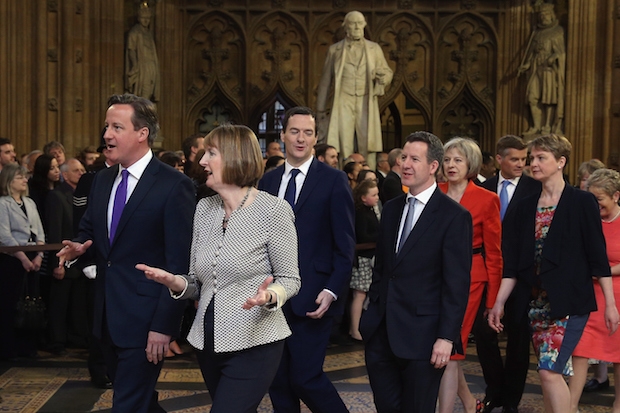One of the toughest jobs in politics is responding to a Budget. It’s the job of the leader of the Opposition, and given the Labour Party has still got two months until it elects its chief, that job falls to Harriet Harman as interim leader. Therefore Harman has an even tougher version of one of the toughest jobs in politics, as she has to work out not just how to scrutinise the government’s spending plans, but also how to stop her party having an unpleasant fight over its stances on certain controversial cuts. If a cut is, in Labour’s view, wrong, then it will struggle to make much headway in opposing it if that opposition only starts in a few months’ time once a new leader is in place and they’ve worked out what they want to do. But similarly the Opposition’s political credibility will be damaged if it strikes a number of strident positions now but then U-turns on them later.
Labour has been discussing the response to the Budget at a number of meetings, including last week’s Shadow Cabinet meeting, and another one today. Harman has also spoken to all the leadership contenders over the weekend about possible policy positions as more details of the Budget appeared in advance in the press. But as I say in today’s Evening Standard, some contenders are planning to make their own statements setting out different stances on controversial issues if they disagree with the conclusions that Harman reaches as she responds on Wednesday.
I am told that Harman will be setting this Budget three tests: how it helps working people, how it improves productivity, and how it will improve infrastructure. On the first issue, the party is very wary of the cuts to tax credits that are expected, not so much because of the principle, but because of the shortfall in families’ incomes that a sudden reduction could cause before wages rise. Articulating that concern without appearing implacably opposed to reducing the welfare bill and ending a government subsidy of low pay will be a difficult balancing act.
On other benefit cuts, the party knows that public opinion tends to be very supportive of such reductions. One of the problems Labour and other opponents of benefit cuts encountered in the last parliament was that the impact of the cuts seemed to be absorbed by tenants in a way that, while probably still quite painful, didn’t result in the sort of statistics that made the case for scrapping a policy. For instance, most people affected by the £26,000 benefit cap for workless households did not respond to the significant drop in their benefits income either by moving house or moving into work. This makes it difficult for Labour to make a case about a massive exodus of poor people from London, for instance. At a conference held by the Chartered Institute of Housing recently, the IFS’ James Browne told the audience of housing association bosses and other housing professionals that ‘previous cuts to housing benefit have largely been absorbed by tenants’, and from the audience, most seemed to agree, with the caveat that this ‘absorption’ tended to involve some pretty miserable choices between heating or eating. The political problem is that if people appeared to cope the last time around, then ministers will tend to think that those who opposed those benefit cuts have little credibility when they oppose the next set of cuts. Indeed, ministers have already made remarks to this effect in public and in private meetings with housing association bosses. This makes Labour’s job more difficult if it does indeed decide to oppose certain policies in this week’s Budget: it doesn’t want to appear to be crying wolf yet again, or setting its face against the convictions of the voters whose trust it needs to win back in order to return to government any time soon.
Another challenge for Labour is that the party now has a Shadow Chancellor who, while very keen to change its image as a recalcitrant opponent of fiscal responsibility, isn’t particularly well-known. Chris Leslie won’t make his official response to the Budget until Thursday, but the Shadow Chancellor also traditionally gives a briefing to lobby journalists in the afternoon of Budget day, offering his first thoughts on any bloopers and drawing attention to any particular themes Labour will be majoring on in the coming days. Ed Balls was a master of this, partly thanks to his own ability and partly thanks to his very effective team of advisers – even if this was undermined by the party leadership’s handling of its overall Budget response. Leslie has a hard act to follow in responding to his first Budget – and this first Budget is a whopper, too.







Comments